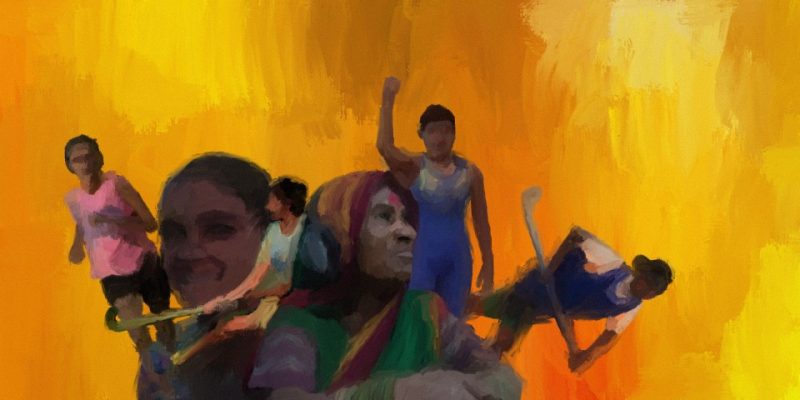During the Navaratri puja – when goddess Durga is worshipped for nine days in her many manifestations – I received many messages and images on the theme of empowered women as symbolised by the goddess. But the images that flashed through my mind were of the many Durgas I see around me – women who have spent their lives living on the margins of their communities, for whom equality and freedom continue to be elusive ideas, yet who face their various oppressive circumstances with courage, fortitude and dignity. Their strength is astounding.
It is these Durgas from the remote villages of Man taluka in Maharashtra’s Satara district – whom I have met in the course of my work with the Mann Deshi Foundation – who continue to inspire and influence my worldview.

Kerabai Sargar, 70: Farmer with a never-say-die spirit, folk singer with a powerful voice, and radio jockey.
The first person who comes to mind is 70-year-old Kerabai Sargar, who lives close to my village, Mhaswad. At first glance, the silvery-haired woman, clad in a traditional irkal nauvari (nine yard) sari and sporting a big red bindi on her forehead, seems like a typical grandmotherly figure.
Nothing could be further from the truth. Kerabai, who greets everyone with a ready smile and a ‘namaskar’ in her powerful voice, is a farmer with an indomitable spirit who has spent the better part of her life toiling in her field under the harsh sun. And now she is known – not only in her area but in the entire state of Maharashtra – as a popular folk singer and radio jockey at the Mann Deshi rural community radio station, located in our village.
In the folk songs Kerabai sings, the interdependence of nature and humans come alive. She sings for and about her shepherd community and the misery brought upon them by constant drought; she sings about the weight of burdens women bear and the poverty farmers face. A fiercely protective mother to her children and her cattle, she has the heart of a poet – “I am prosperous beyond words. Every morning, the sunlight visits my aangan (courtyard) and every night, the moonlight arrives,” she says.
In fact, it was the pain in her words, uttered during the terrible drought of 2012 in our region, which spurred the Foundation to embark on a water conservation programme that has now impacted over 50,000 people in our area. Kerabai had asked, “What is the point of having a women’s bank [started by the Foundation] when there is no water? What will you do if we all leave? I can have gold, but what is the point of all this gold if I cannot even mortgage it to provide water and fodder for my animals simply because there is no water or fodder available?”
Also read: The Queen’s Gambit: A Thrilling Look at What Could Happen in the World of Chess
Kerabai talks about her life with an astonishing composure and lack of bitterness – born to a poor family from a nomadic tribal community, she was 10 when both she and her sister were married off to a man much older than them. Pregnant at 13, when she was routinely beaten up and starved by her husband, her only solace would be to run off to the field to hide. To forget her hunger and pain Kerabai would sing the songs she had learnt on her mother’s lap – songs about the tulsi plant, women’s work and their hardships, and of the land around her.
Kerabai is unlettered but she ensured that her daughters and son received an education. One of her daughters is an ASHA worker, and her son is a gram sevak. As for Kerabai herself, the woman with the beautiful timbre who radiates dignity, while she has created a space where she can express herself freely, she continues to look after her husband. Her singing, which has helped her become part of a larger community, is her greatest strength.

Nagabai: Living a life determined by unequal gender relations, the young woman in her early 20s has crafted her personal meaning of freedom.
Almost five decades younger than Kerabhai is Nagabai from Gangoti village, whose name, meaning unwanted girl, has cast a shadow on her life. The youngest among four sisters and a younger brother, her dream was to become a professional kabaddi player – she was strong and quick – and “wear nice clothes like the city girls”.
Sadly, that was not to be. When the harsh drought of 2012 hit Man taluka, Nagabai’s family moved to a cattle camp for 18 months, and she was forced to drop out of school to take care of their cattle. By 17 she was married and began working alongside her husband as a daily wage labourer in my village. She is about 22 now and has a child.
In some respects, Nagabai’s life has followed the same pattern as Kerabai’s, separated by two generations. But she is unwilling to wait several decades to express her yearning for freedom in some way, so she can be seen racing across the village in her father’s motorcycle, her hair flying in the wind, the passion and joy evident on her face.
It is rare for women in her community to take to this ‘male’ pursuit. Once when some boys mocked her for doing so, she shut them up with a withering look. It will be worth the wait to see how this Durga negotiates curtailing circumstances as she advances in age, maturity and confidence.
Nagabai reminds me of another young girl I met – Nakusa – whose name also meant unwanted daughter. In May 2015, while travelling through the villages of western Maharashtra, I happened to come across a group of labourers cutting sugarcane in a field in Patan tehsil. They were from the Dhangar nomadic tribe. What caught my attention was 13-year-old Nakusa playing with a ball she had fashioned out of cotton rags, laughing in sheer joy as she repeatedly threw the ball in the air, catching it easily each time. Her skin was burnt by the sun, her hair sallow from constant exposure to the elements, but her face had a brightness that was striking.
Watch: How a 12-Year-Old Kashmiri Girl Became India’s First Sub-Junior Kickboxing Gold Medalist
This was no carefree child; she was a child labourer taking a short break from the back-breaking task of cutting sugarcane for about 10 hours a day, with the added task of keeping a look-out for snakes which are usually found in these fields. But in those 15 minutes when she was playing with the ball, oblivious to the world, Nakusa had risen beyond her harsh surroundings. She was totally joyful. It was an important lesson for me as I saw the power of sports, of play.
That was when I resolved to start the Mann Deshi Champions, a sports programme for children from tribal and deprived communities. I don’t know where Nakusa is today, but the idea she gave me has struck root – since the programme started, we have worked with over 7,000 children and young people. Our champions programme, which regularly holds spotting competitions, has nurtured hundreds of Durgas who have become trailblazers.

Kajal Atpadkar, 17: The girl who used to work barefoot in the sugarcane field plays field hockey for Maharashtra state.
One such champion is 17-year-old Kajal Atpadkar from the Lonari nomadic tribe, born to a family of daily wage workers. She spent the first 10 years of her life working alongside her family. Their condition was such that Kajal did not even own a pair of shoes. She would wrap sugarcane leaves around her feet to prevent them from getting burnt by the scorching hot earth in the summer months when the temperature would shoot up to 44 degrees celsius.
Although her four sisters were married off before they were 15, Kajal was determined to do something else. Today, she plays field hockey for the state of Maharashtra. She wears green hockey shoes to remind her how far she has come from the time she used sugarcane leaves to protect her feet.

Kajal Atpadkar in the hockey field: daring to dream.
This Durga, who grew up moving from village to village in a bullock cart, has trained hard to reach a position where she now flies across the country for matches. “Everyone has the power to change their fate. Sports is my god,” she says. This young woman, who dreams of playing hockey for India, has inspired hundreds of girls in her community to take up hockey.

Kajal Jadhav, 17: The first girl in her village to become a wrestler.
Then there’s another 17 year old, Kajal Jadhav, who has broken harsh gender norms to become the first female wrestler from the tiny village of Madha. Her father would spend hours coaching his son to be a wrestler. Little did he know that his daughter was watching him and learning the moves.
One day, Kajal entered a local wrestling competition for boys without telling her family. The secret was soon out because she won the competition! Today Kajal has over 11 national medals, but it is her very first victory, when she broke the cultural taboo restricting girls from pursuing the sport of wrestling, that she remembers most fondly. Now the young champ, who has cleared the way for other girls to follow, has set her sights on winning an Olympic medal.

Sarita Bhise, 19: The shepherdess who became the captain of Maharashtra’s field hockey team.
To see young champions emerging from such difficult circumstances has been a most humbling experience. Take the case of Sarita Bhise from a village called Dhuldev (god of dust). Hailing from the shepherd community, she would spend half the year on the move with the cattle, covering about 400 km on foot. The girl who was not able to attend school too often, became an expert tracker of wolves and hyenas. That was her life till about 13 years.

Sports has shown Sarita Bhise the way to face challenges unflinchingly.
Once Sarita got to know about the sports programme, she wanted to be part of it. Today, at 19, she is the captain of Maharashtra’s field hockey team. However, her challenges have not ended as some of her family members want her to get married. But if there is anything Sarita’s involvement in sports has taught her, it is that it is possible to overcome all challenges provided one is determined to do so.

Reshma, 21: From buffalo herding to long distance races and marathons, this young athlete has demonstrated the power of determination.
Then there is the slightly built powerhouse, 21-year-old Reshma. Before she joined the champions programme, she used to herd buffaloes. Today, she runs long distance races and marathons and is a role model for all the local girls in her area. The fourth daughter in her family, she is the primary breadwinner, having won competitions in the Virginia state invitational cross-country competition and in San Francisco.

Reshma (centre): The primary breadwinner in her family.
Moreover, this Durga doesn’t take anything lying down. She is famous in her area as the girl who has the confidence not only to strongly tick off a stalker but also to travel independently across the country and the world without being conversant in English.
The irony is that on her return from her international achievements, Reshma cooks for her family, helps with the domestic chores and also works on the field. Truly a Durga with many arms! Would a male athlete performing at the international level do so or be expected to do so?
Be it the 70-year-old Kerabai, Nagabai, Nakusa, Kajal, Sarita or Reshma, what is common to them is their courage, their wisdom, and their fighting spirit in the face of adversity. These and many others like them are the real-life Durgas striving to change the contours of their lives by creating spaces of freedom where they can express themselves. In doing so, they inspire so many others. It is time that they too are acknowledged.
Prabhat Sinha, a former athlete, is a sports agent and a honey hunter. He runs a sports programme for rural and tribal children of Maharashtra, Manndeshi champions, and hopes that his proteges will represent India in the 2024 Paris Olympics.




